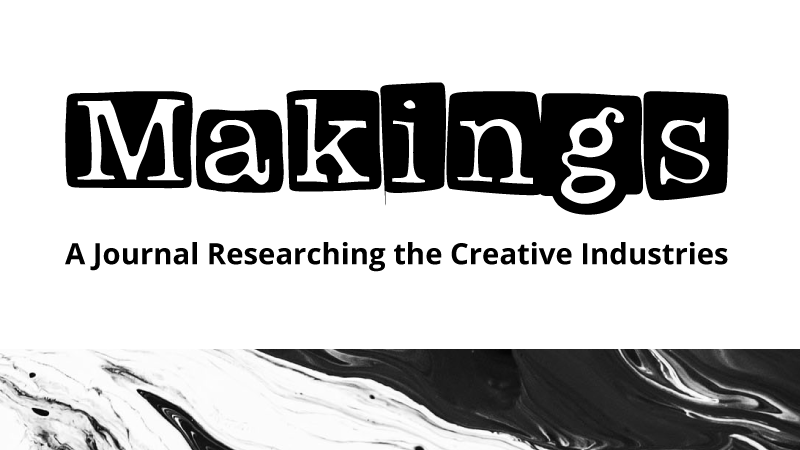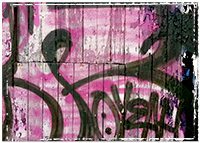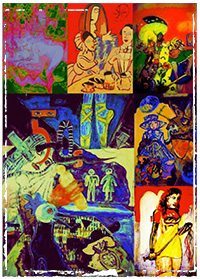Makings journal, co-edited by Kateryna Sivak and Vincent Obia, PGRs of the Creative Industries research cluster, is excited to release a call for proposals for a new guest-edited issue.
The What
The theme for this special issue of Makings is titled ‘Gentle Gestures: contexts, spaces and approaches in and beyond the academy’. Following on from the last special issue ‘Creative Higher Education: Curriculum and Pedagogy’ (2022), this issue aims to consider how informal, alternative, fluid or gentle positions of learning (re)articulate where, how and with education can happen.
Thinking with and through projects and initiatives that work inside, against, and beneath existing university structures, the issue is keen to explore spatial, peer-led, and nomadic sites of learning in relation to creative work and precarity, the role of critical pedagogies in creative action and learning across Art, Design and Media, and the influence of these para or alternative practices in relation to existing academies. Proposals could address nomadic art schools and alternative structures of resource and learning distribution, but also artist-led initiatives and gallery-focused pedagogical or peer-to-peer networks held within (or despite) institutional frames.
We welcome submissions from emerging researchers, artists, and educators with limited experience of academic research. We encourage a diverse range of submissions from conventional to practice-based contributions (visual, video, audio, etc.) for the Studio section of the journal.
The Wider Gesture
‘Gentle Gestures’ is a term, signal, mark, motion, movement of the body, a research subgroup, a conversation that invites inquiry into submerged, fugitive practices of gentle change beyond the now increasingly strained ideas of practices of care. Researching across art, creative practices, pedagogical inquiry, practice-based research, and critical theory, Gentle Gestures aims – through a loosely held collective of people thinking alongside each other – to explore ways knowledge production is embodied, pleasurable, multiple, empowered, navigated, inflicted, and shared. This can take the form of performativity of pedagogy or the performativity with pedagogy: being body / bodily material / body as liminal space / a process of becoming / to push up / to push against / rub against/ rub with. As a wider research theme, it is as much about locating a theoretical framework or practice method as it is about developing embodied propositions as artist-pedagogical value-(un)structures. This special issue is rooted in interests and approaches which seek to offer an expansive container for researchers working in kinship or proximity to it.
The Why
This issue will offer a re-examination of sites of learning in terms of where learning happens. Who has access to learning and what non-institutional structures afford creative activity and social action? Proposals could examine the neoliberalisation of creative practice through terms such as ‘industry-ready’ ‘innovation’ or ‘artistic entrepreneurship’, methods through which the undercommons (Moten and Harney, 2013) is practised or expanded, how learning is used in, through and amidst artistic and design practices. Examples of learning sites could include participatory, instruction-based, text, live-action role play, performance, video, installation, sound, voice, collaboration, curatorial and learning programming – the key is seeing the process of learning or making as the creative work. Through a re-evaluation of the relationships between process, arts production and pedagogy within accelerated developments of neoliberalism, what can be uncovered and speculated on in relation to forms of collectivising and democratic politics?
This special issue is also built upon and acknowledges the work of multiple alternatives to arts education and higher education initiatives, including but not limited to Tent City University, School of the Damned, AntiUniversity Now, Open School East, The Silent University, Copenhagen Free University, Liverpool Free University, Really Open Uni, Alternative Art College, AltMFA and BFAMFAPHD. Each of these also can be seen as a continuation of a radical legacy of alternative methods, practices and schools across the 20th Century.
The issue will hopefully provoke and propose ways in which learning can be used to engage with critical pedagogy (hooks, Freire, Giroux) in relation to the continued commodification of education and learning within our institutions and create dialogue that offers space for varying investigations towards new models, conception and practices that explore learning as a social action. Where does learning happen? Where (when, how) can knowledge be seen, shared, and democratized through art practice?
Proposals could be around:
- Alternative art school approaches to higher education
- Inside/outside institutions
- Site and non-site
- Access, equity and hegemonies within alternative sites of (art) learning
- Representation and power, presentation and being or agency
- Art and commitment
- Mediums and materials
- Methods of pedagogical art making
- Social engaged practices, ethics of collaboration and learning
- Non-hierarchical approaches to knowledge exchange
- Galleries as sites for learning / Institutional critique, diversity of practice and ways inequalities are reproduced
- Critical pedagogical methods
- Material and context – artist led-initiatives
- Representation and identity
- Methodologies and tactics of radical practice
- Voice and sound
- Temporary zones and spaces
- Non-traditional pedagogies
- Facilitation and dis/abling arts education
In its broadest sense, this call for papers is an attempt to address the paradox between the proliferation of the commodity of learning and the apparent crisis of arts education. As such, it will appeal to artists and researchers of education, pedagogy and the arts with interests in social, queer, and critical theory.
Types of submission:
- Traditional academic papers (approx. 4000–5000-word papers excluding bibliography)
- Practice-led papers (1500–2000-word papers (excluding bibliography) alongside practice-based research, this could be images, video, text any media relevant to the research context)
- Studio submissions, think pieces and media only works. These will not be peer-reviewed but explore more experimental and new ideas.
Applications requirements:
- For Academic Papers please submit a 300-word abstract (or equivalent voice note or video submission)
- For Practice-led papers please submit a 200-word abstract (or equivalent voice note or video submission) and a visual/audio example of the practice research.
- Studio Submissions, please submit a 200-300-word description (or equivalent voice note or video submission).
To submit your abstract or for more information or discuss any specific access or requirements to support your submission please contact Paul Alexander Stewart p.stewart@tees.ac.uk
Timeline
Abstracts and acceptances:
- Submission deadline for abstracts by Monday 31st July 2023
- Acceptance and notifications by Monday 1st September 2023
Articles:
- Final articles/contributions by Weds 31st January 2024
- Revised articles/contributions by Monday 4th March 2024
- Publication May/June 2024
Writing retreat (online):
There will be an invitation for early-career or emerging researchers, whose abstracts have been accepted, to take part in an online day writing retreat. This is an opportunity to develop your abstract into a full contribution in a supportive environment. The special issue guest editors will facilitate the retreat. This will take place in November 2023, exact date TBC.
Editorial team:
Dr Paul Alexander Stewart, Teesside University, Middlesborough, UK – Administrative lead
Roshana Rubin Mayhew, Royal College of Art, London, UK
Sophie Mak-Schram, Zeppelin University, Friedrichshafen, Germany
Anouk Hoogendoorn, independent artistic researcher, Amsterdam (NL) / Montréal (CA)


